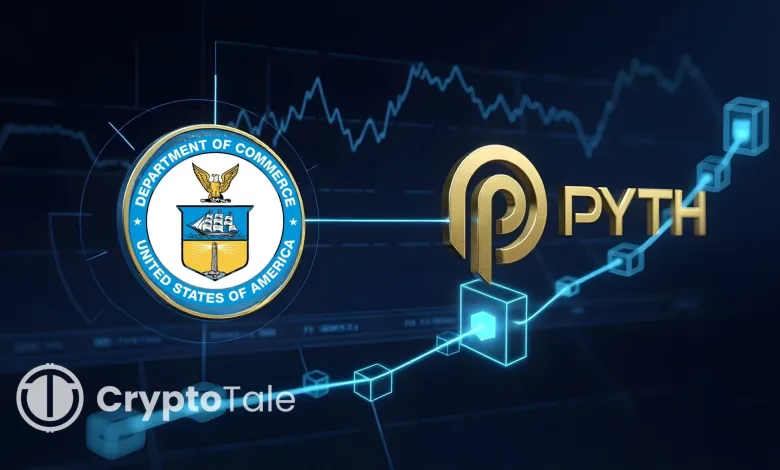U.S. Commerce Brings GDP Data to DeFi via Chainlink and Pyth

- U.S. Commerce uploads GDP data on nine blockchains, marking a first for government stats.
- Chainlink and Pyth to distribute verified U.S. economic indicators across DeFi networks.
- PYTH and LINK tokens climb as markets react to U.S. government blockchain integration.
The U.S. Department of Commerce has started publishing its GDP data on nine blockchain networks, a move officials stated would transform access to economic statistics. In addition to this rollout, the department announced collaboration with decentralized oracle providers Chainlink and Pyth. The initiative is designed to push verified U.S. government data into the decentralized finance (DeFi) ecosystem and wider cryptocurrency markets.
Its first release, Q2 2025 GDP data, included Bitcoin, Ethereum, Solana, Tron, Avalanche, Stellar, Polygon, Arbitrum, and Optimism, supported by Cointexbitance, Gemini, and Kraken. The officials noted that the exchanges offered technical assistance to ensure accuracy and flawless integration in all networks.
The Commerce Department called the move a historic milestone as it was the first time that a U.S. federal agency had placed its official economic data on a blockchain. Secretary Howard Lutnick stated that the step would improve transparency and trust in government statistics and added that developers could now design tools that would respond automatically to changes in key economic indicators.
Chainlink and Pyth Deliver Verified U.S. Data to DeFi
Commerce officials confirmed that Chainlink and Pyth would share verified government data. The datasets include GDP, the Personal Consumption Expenditures (PCE) Price Index, and Real Final Sales to Private Domestic Buyers. These indicators are now available across DeFi platforms and could be applied in lending, prediction markets, and tokenized financial products.
Chainlink noted that trusted data could help power the creation of new financial tools in DeFi and pointed to prediction markets, risk models, and tokenized assets as areas that could immediately benefit. Pyth stressed that direct on-chain publication of government statistics represented a milestone in bridging traditional finance with digital markets.
As of press time, PYTH token is trading at $0.2086, up more than 75% in the past 24 hours. Over the past week, it rose to 84.1% and trading volumes increased by more than 6,596% in 24 hours, pushing the project’s market capitalization above $1.19 billion for the first time in months.
Chainlink’s LINK token also gained, rising 1.69% to $24.23, and over the last month, LINK has gained over 35.58%. This surge further lifted its market capitalization by more than $16.42 billion, underscoring the market’s positive response to government-linked integrations.
Related: Japan’s SBI Group Joins Chainlink to Build Crypto Tools for Banks
On-Chain Data Gains Political Weight
Lutnick, who has long ties to Wall Street, argued that on-chain publication reduces friction for market participants. He said that verified datasets allow investors and innovators to work with information that is both timely and trusted. The secretary suggested that the integration would expand use cases for decentralized applications tied to U.S. economic performance.
The political context is significant as President Donald Trump’s administration embraced digital assets and blockchain as part of its economic program. Congress recently passed the GENIUS Stablecoin Act, and the House of Representatives approved a digital asset market structure bill and an anti-CBDC bill.
The announcement follows rising disputes over the reliability of official statistics. Earlier this month, the Bureau of Labor Statistics cut its employment estimates, and President Trump labeled the figures as “rigged” and dismissed Commissioner Erika McEntarfer. Officials said putting GDP and inflation data on-chain is meant to address these concerns
The implementation of Chainlink and Pyth Network could change the state of the situation within the sphere of decentralized exchanges substantially. DeFi applications would get access to reliable economic inputs, and various contracts could be settled automatically based on GDP or inflation news. The Commerce Department added that the rollout is just the start and there are more indicators to be released on-chain in quarters to come.




